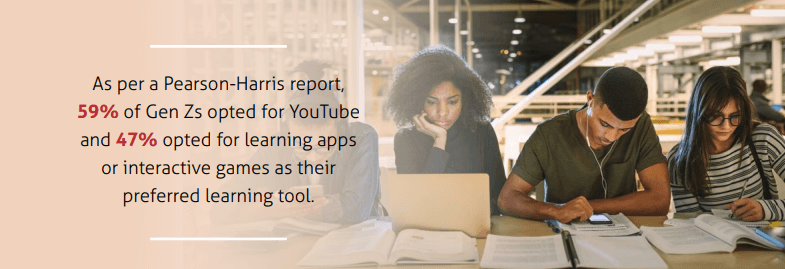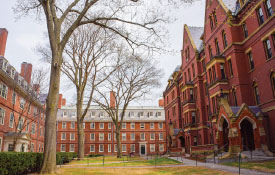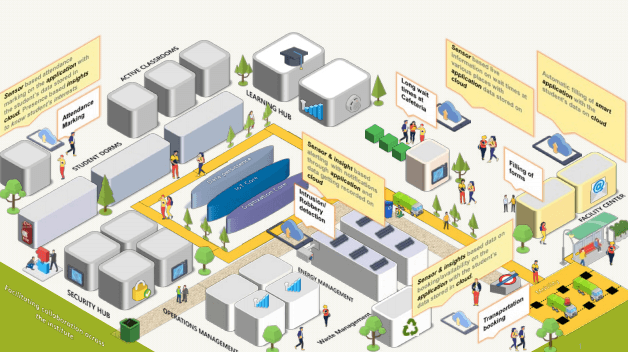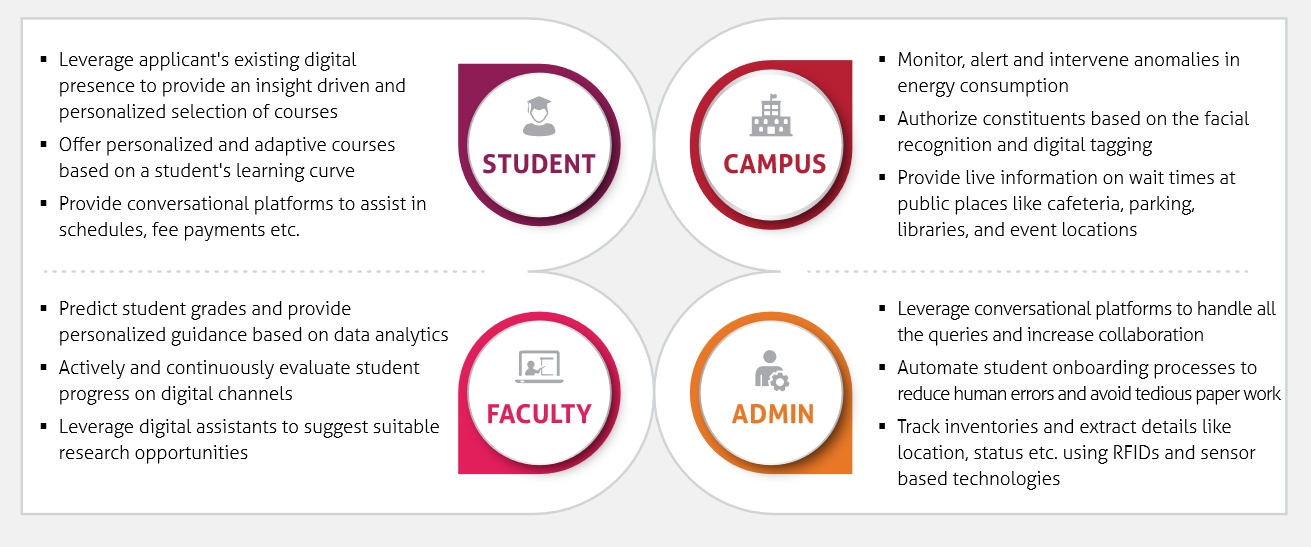
Enabling higher-ed institutions to become contextual, insight driven, interactive and personalized
The turn of this decade witnessed the graduation of millennials and entry of a next generation of students dubbed as Gen Zs. While millennials are tech-savvy, Gen Zs are digital natives who expect higher-ed institutes to lead the pack in adopting new technologies. They assume that institutes offer an environment where students learn and experiment with the latest and greatest across all fields. Their unconscious expectations of a seamless, connected and smart campus have become table stakes for higher-ed institutions. Moreover, ecosystem components - like next generation faculty members and administrators who expect consumer grade experiences - also tend to gain from smart campuses.
Fulfilling these ambitions has been a tussle for institutions grappling with discrete ecosystems and unperceptive data.
While the next decade may challenge the very concept of imparting education within institutes, it may also open avenues that were never heard of before. Investments made today towards smart campus initiatives will catapult such institutes to the next orbit of growth.
Gen Zs will place greater demands on higher-ed institutes
Gen Zs, born in the digital era, are immersed in technology in every aspect of their lives and hence, expect institutes to engage them through various digital means. They stay connected, multi-task across screens, and adopt new technologies faster. As per a Pearson-Harris report, 59% opted for YouTube and 47% opted for learning apps or interactive games as their preferred learning tool.
They expect personalized learning experiences and do not see technology as a transformative phenomenon for learning. At the same time, they are more cautious online, share personal data more prudently and opt for private platforms which have less permanent digital footprints. Gen Zs are also mindful of protecting the planet and favor initiatives that reduce carbon reduction. They strongly believe that institutes should address urgent social and environmental issues.
Higher-ed institutes lack a comprehensive technology strategy
Higher-ed institutes are comparable to mini cities. They have a dynamic flow of operations, occupy several acres of land, with several buildings and numerous departments to their name. While they aspire to improve experiences for their constituents - students, faculty, admin, and staff - they are marred by various roadblocks such as:
- Digital Integration: Silo applications, poor data management, and lack of architectural standards lead to poor integrations. They also inhibit institutes in providing contextual, insightful, active, or personalized services.
- Connectivity: The absence of integrated IoT platforms leads to a lack of automated and high-touch experiences. Also, limited wireline and wireless networks impede ubiquitous connectivity and scalability.
- Cost Pressures: Institutes face cost pressures due to continuous maintenance and upgradation of their facilities and higher energy demands. This leads to delays in technology refresh initiatives.
- Privacy and security: Institutes mine student data which leads to privacy concerns. They need to manage trade-offs between convenience and privacy. At times, there is limited compliance to federal and state privacy regulations. They are also exposed to security threats due to lack of processes to manage student data efficiently across platforms.

Creating the need for a next-generation smart campus
Higher-ed institutes who are investing in smart campus initiatives need to have four key characteristics. They need to be:
- Contextual: Providing context-based services which are environment and location-driven
- Insight Driven: Inferring and taking better decisions by deriving insights from data
- Interactive: Encouraging active engagement within the institute and its constituents
- Personalized: Providing personalized guidance and advising timely action
The above characteristics can be achieved by building a foundational technology layer that is:
- Connected and intelligent
- Modular, scalable, open and flexible
- Sustainable and cost efficient
- Sustainable and cost efficient
Mindtree’s Smart Campus offering:
Mindtree’s Smart Campus offering helps institutes build a digitally connected campus with enhanced experience, driving operational efficiency and providing accessible education anywhere and anytime. This offering helps institutes envision and move to a smart symbiosis using mobility, energy efficiency, digitalization core, security, safety and user experience by integrating Artificial Intelligence along with IoT, and by shifting traditional operations to the cloud to embrace its benefits. The offering provides a distributed service fabric enabled by a microservices-based architecture and work-order orchestration that unifies communication between siloed institute departments
It has the following core architecture layers
- Cloud management platform: Enables dynamically configurable resources and high scalability through an on-demand service cloud computing model
- Intelligent sensing system: Sensor-based system translating the physical stimuli into digital data as an input to data analysis for appropriate decision-making and action
- Data analysis infrastructure: Includes building a data lake with data mining techniques in order to store, manage and analyze data which provides decision-making information
- Smart application packaged system: Smart application packages covering different departments within an institute
Enabled by Mindtree’s implementation blueprint
Figure 1. Proposed implementation architecture for smart campus infrastructure
Mindtree’s core guiding principles for Smart Campus solution
- Holistic architecture: Incorporates a diverse technology stack while offering security and resilience
- Persona centric: Focuses on personas, constituent journey, and constituent experience for providing contextual information
- Automated workflow orchestration: Reduces manual efforts through work-order-based orchestration management of a campus
- Dashboards and reports: Real-time updates of processes, infrastructure, and applications to make datadriven decisions
- Modular and scalable: Microservices-based architecture with loosely-coupled components
- Interconnected: Provides interconnectivity between departments through an enterprise service bus
Key capabilities realized using smart campus:
Mindtree’s smart campus offering will enable the below use cases across the institute:
Built on capabilities across constituents
Benefits achieved from a Smart Campus
- Frictionless institute experience: A digitally connected institute boosts the student experience
- Reduced student attrition: Predictive models identifying at-risk students and reducing student attrition by at least 20%
- Student success: Improved student learning through better student-faculty engagement
- Sense of safety: Smart campus helps make students, faculty, and staff safer
- Higher efficiency: 50% increase in efficiency and 20% savings per year on maintenance and energy costs
The Mindtree advantage:
Mindtree combines its higher-ed experience, digital transformation expertise, and industry partnerships to build a smart campus roadmap for its clients. Mindtree has multiple proprietary next-generation technology platforms to enable higher-ed institutes in their smart campus journey. Some of them are – Gladius, an IoT platform related to smart and connected buildings for energy efficiency, access and video surveillance, Decision Moments for intelligent predictions, Shotclasses for mobile-based micro-learning, Intelyzers for intelligent and automated cloud operations, CAPE for IT lifecycle and DevSecOps automation, and MWatch for infrastructure management and operations.
Mindtree delivers great outcomes for its clients
- Achieved increased operational efficiency with a cloud-based IT ecosystem that brings data and partners together for business value realization for a leading business school
- IoT platform used to detect spills and avoid fall incidents that reduced personnel accident cost by 20% for a large Australian retailer
- 60% reduction in manual effort of handling service requests with automated service workflows on ServiceNow for a leading public research institute
- Enabled data driven decision making with cloud-based EDW, leading to a minimum of 20% cost savings in operating efficiency for a large graduate school
Mindtree’s industry recognition
ISG Provider Lens (2018) – Rising Star in overall Internet of Things services
ISG Provider Lens (2019) – Rising Star in global cloud transformation/operations services
Zinnov Zones (2019) – leader across digital services including legacy modernization
The Mindtree Education Industry group
Mindtree’s Education Industry Group has 200+ experts, more commonly known as Mindtree Minds. Mindtree, with its deep experience in education, has become a trusted technology partner for higher-ed institutes across the globe. Our digital transformation strategies, roadmaps, and implementations are designed to deliver reach, affordability, and most of all, an adaptive environment that constantly adjusts to the emerging needs of students. Our solutions deliver richer, broader, and personalized experiences for its constituents. Mindtree is positioned in Leadership Zone for Publishing and Education in Zinnov Zones 2017 report.
Download the white paper



